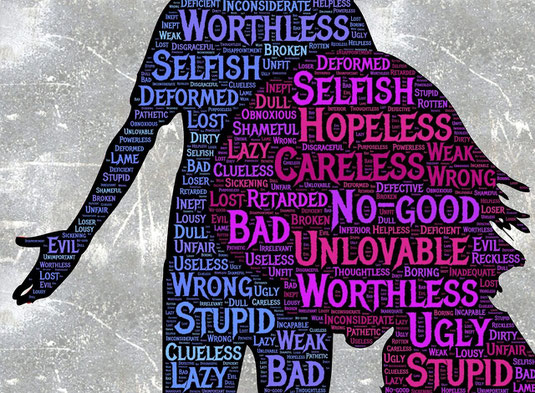CBT FOR LOW SELF-ESTEEM
WHAT IS LOW SELF-ESTEEM?

Self-esteem refers to the beliefs you have about yourself and the value you place upon yourself as a person.
If you have low self-esteem, your view of yourself is generally a negative one. Self-critical and self-doubting, you will tend to focus on your perceived weaknesses or mistakes. Typically, you blame yourself for any personal difficulties or failures experienced, and underestimate or ignore your positive qualities. You may feel:
- Like you dislike yourself or that you are not good enough
- Like few people like you
- Undeserving of happiness
- Under-confident; overly apologetic; unassertive
- Like downplaying your strengths or deflecting compliments
- Unattractive or unlovable
- Unable to make decisions
- Guilty for spending time/money on yourself
- You may blame yourself for things that aren't your fault
- You may constantly compare yourself and feel inferior to others.
CAUSES OF LOW SELF-ESTEEM
The roots of low self-esteem are often found in negative experiences during your childhood or teenage years. Difficult family relationships; not meeting the standards of your parents or peer group; feeling neglected, ignored or abused; being bullied or made fun of; not doing well at school or sports; feeling different to your peers – these and a multitude of other experiences can shape our sense of self.
Sometimes, low self-esteem results following negative experiences that occur later in life. These can include difficult relationships, workplace bullying or intimidation, ongoing stress, unemployment and financial difficulties, traumatic events, or social isolation and loneliness.
One’s personality and temperament may also be a factor. Some people are more prone to negative thinking patterns and to anxiety and depression. These all tend to reinforce low self-esteem.
CONSEQUENCES OF LOW SELF-ESTEEM

Low self-esteem can have painful and damaging effects. It can negatively impact your personal life, relationships, educational and work life.
Work/school: You may consistently fall short of your capabilities, avoiding new challenges and opportunities for fear of not doing well. This avoidance invariably backfires as it only further dents your confidence. This then reinforces your negative self-image. Alternatively, you might push yourself too hard, believing you must make up for or cover up your apparent lack of talent.
Recreational and social life: If you have low self-esteem, you may avoid leisure activities where you feel you may be negatively judged or evaluated – for example, sports, social situations and competitions. Some people have a very punishing inner voice. They may avoid pleasurable activities and neglect their hobbies because they feel undeserving.
Relationships: Low self-esteem can affect personal relationships in multiple ways. You may be too accommodating, bending over backwards to please others and not standing up for yourself when necessary. The opposite is also true – some people with low self-esteem can be defensive and overly aggressive in their dealings with others. Perceived criticisms or arguments can be taken to heart. This results in seemingly minor events becoming a source of upset and distress.
Life prospects: Research shows teenagers with low self-esteem are at greater risk of mental and physical health problems, have worse economic prospects and higher levels of criminal behaviour during adulthood, compared with teenagers with high self-esteem. Low self-esteem has also been linked to an increased risk of teenage pregnancy and substance misuse.
Mental health: Depression and anxiety can cause low self-esteem, but the opposite is also true – low self-esteem can cause depression and anxiety. The two can reinforce each other, creating a vicious cycle.
CBT AND LOW SELF-ESTEEM: TREATMENT

Cognitive behavioural therapy (CBT) is an ideal approach for tackling low self-esteem as it is primarily a cognitive (thinking) problem. Thus, it is treated by restructuring negative, self-critical thinking patterns and by actively directing your attention to your strengths and qualities.
CBT helps you see the connection between your thoughts, feelings and behaviour. This helps alert you to the damaging consequences arising from what researchers label as negative automatic thoughts (NATs). You learn to stand back from these thoughts, to identify and challenge them, to take a more balanced and compassionate view of yourself.
Research shows low self-esteem is underpinned by thinking biases, by biased perceptions and biased interpretations. Biased perceptions mean you are quick to spot things that confirm your negative self-image; at the same time, you screen out contradictory evidence that points to your good qualities. Biased interpretations refers to the tendency to distort the meaning of your experiences. For example, someone may compliment your appearance but you take this to mean you had previously looked unattractive, or that they didn’t mean it and were ‘just trying to be nice’.
Behavioural experiments and behavioural change will also be central to therapy, helping to break the vicious cycle of low self-esteem.
Low self-esteem often builds up over many years, limiting your life in so many ways. Like a bad habit, people are not always fully aware just how routinely they put themselves down. However, we can develop new ways of seeing ourselves at any age. Tried-and-trusted CBT methods can help people to live the life they deserve.